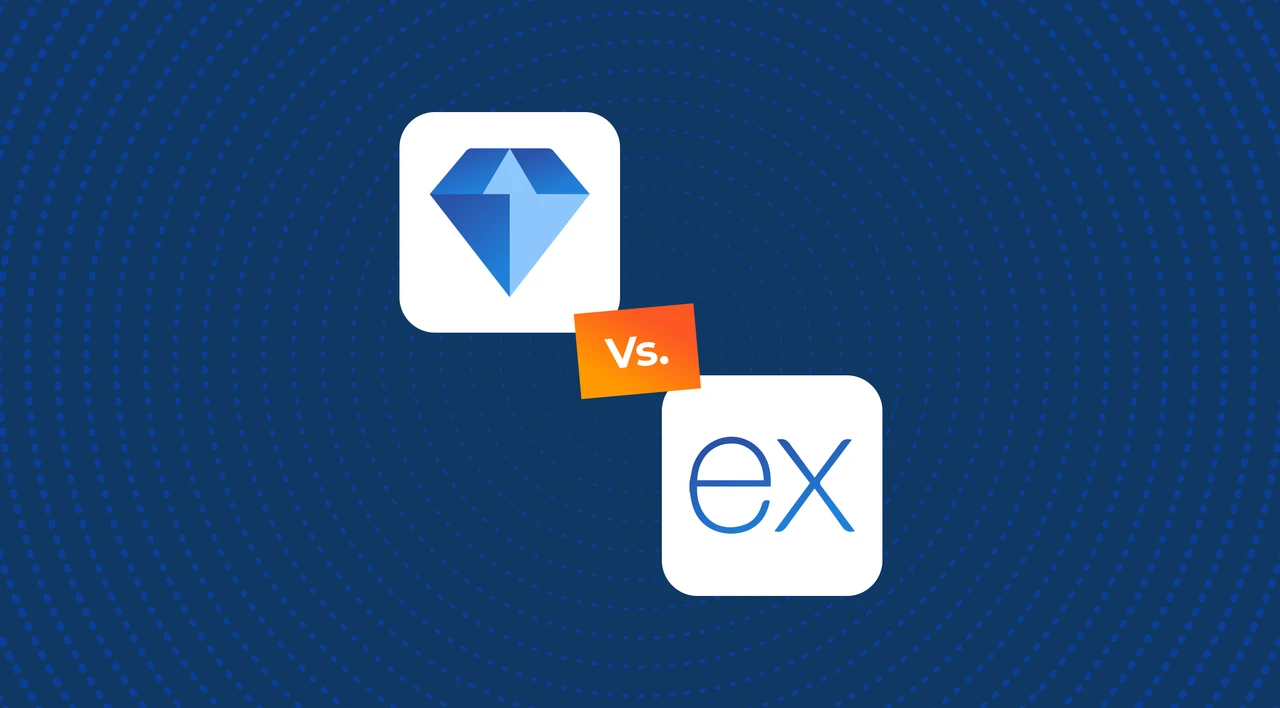SHARE
Ruby on Rails vs. Express.js: Which is Better in 2025?

Contents
Contents
Introduction
Ruby on Rails and Express.js are two of the most popular options out there for web application programming. Ruby on Rails is a full-stack web framework built on the Ruby programming language, while JS Express is a minimalist web framework built on Node.js.
Both frameworks have their strengths and weaknesses that set them apart from one another, and as a developer, you are most interested in finding out which of the two is most suited for your work.
Well, read on, as we compare both frameworks, highlighting the key differences between them, and how they may influence functionality and performance.
In the end, we hope that you would have learned enough to make the best decision about which framework is best suited to your needs.

What is Ruby on Rails?
Ruby on Rails, sometimes just referred to as “Rails”, is a web framework for full-stack web development. It isn’t uncommon for Greenhorns to confuse it with Ruby – the programming language on which it was built.
But while Ruby (the language) was created by Yukihiro Matsumoto sometime in the mid-1990s, the Rails framework was developed by David Heinemeier Hansson and first released to the world in 2004.
Rails is designed to make web development easier by providing developers with a set of conventions and tools that allow them to build web applications quickly and efficiently —basically, accomplish more with less code.
Some of the key features of Rails include its emphasis on convention over configuration, its ability to generate boilerplate code, and its active community of developers who contribute to the framework’s development and maintenance. Plus, a lot of developers say that it just makes web application development much more fun.

What is Express.js?
JS Express is another web application development framework created for Node.js; for creating server-side web and mobile applications. It was designed by the legendary open-source developer – TJ Holowaychuk, and released in 2010. On the project’s website, its current owners aptly describe it as “a fast, opinionless, and minimalistic web framework for Node.js.”
Designed to be a flexible and lightweight framework, Express provides a set of tools and features for building web applications, including routing, middleware support, and the ability to handle HTTP requests and responses.
Advantages of Ruby on Rails over Express.js
One of the top advantages of Ruby on Rails as a development framework is how optimized its design is for the purpose. It comes with a number of packages pre-included, including built-in support for an SQLite database, which makes the process of web development considerably faster and easier. Web development time on Rails is generally estimated as between 30-40% lower than in other programming languages.
Also, we must mention that Rails’ syntax is considered pretty intuitive, or simply easy to learn. The implication of this is that you and the engineers on your team would not have to give up dozens of hours just to learn how to navigate. You can learn and attain proficiency, as you go.
Rails is also known to be pretty flexible in its application. Its modular design does not just enhance programming speed, but it is also easily modifiable and expandable, thus providing advanced flexibility.
Advantages of Express.js over Ruby on Rails
Ask any developers who have used the Express framework to describe the experience, and chances are that they will describe it using this one word; lightweight. The framework is designed with minimal base functionalities that come ready to use and allows users to then customize necessary middleware to respond to HTTP requests.
Another advantage of the Express framework is the sheer abundance of educational resources that have been published by the many expert developers who have used the framework. With these resources, anyone can easily leverage accumulated knowledge, to learn what they need to find their way around Express.js in as short a time as possible.
There is also the fact that it is built for Node.js, and is one of the most popular frameworks associated with the language. So one can be sure that it will continue to be supported for quite a while, and that efforts will also continue to be made to ensure improvement of the framework.
Rails vs. Express.js: Which Web Application Framework?
Rails and Express.js have their significant unique strengths, but they are also similarly fast, highly functional, and well-regarded in the developer community.
So, how do you as a developer looking to make the best choice for your project know which one to choose?
Well, neither of them is explicitly a better choice than the other. However, you can decide which one is best suited for you, by comparing them based on the parameters required by your project.
Development Speed vs Flexibility
Rails is an incredibly fast framework for building basic web applications, estimated to be 30 – 40% faster than most other web development frameworks. So, if you are optimizing for speed, the Ruby on Rails framework may be your best bet.
Express.js on the other hand provides developers with a lot of flexibility since it comes pretty lightweight; allowing developers to configure it to their needs. So, if your project requires significant levels of flexibility, you may want to choose the Express framework.
Scalability
Node.js, the language on which the Express framework is built, is known for its high performance and scalability. This makes Express a good choice if you intend to build real-time applications that require high performance and low latency.
Ruby on Rails, on the other hand, has developed a notorious reputation for scalability issues. It was used in the early development of well-known websites such as Shopify, LinkedIn, Twitter, Groupon, Airbnb, and PayPal.
However, they all migrated to Node.js and other suitable platforms, when the websites’ user traffic began to expand.
Scalability is an ever-present concern in the development of web and mobile applications for businesses. Unless the business for whom the apps you intend to develop does not plan on expanding further, you may want to choose Express.js.
Summary
As we have said, both Ruby on Rails and Express.js are highly capable web development frameworks with their individual strengths and weaknesses; which we have discussed in detail in this article.
However, your choice should boil down to the specific needs of your project. So, the first thing that you may want to do in choosing one of both is to conduct an assessment of your project and its needs. You can then compare both frameworks, based on these needs, to figure out which one is best suited for your project.
Frequently Asked Questions
Now, to provide answers to some of the most frequently asked questions about Rails and Express.js.
What alternatives are there to Ruby on Rails and Express.js?
If you would prefer not to use either, there are quite a few options for you. In place of Express.js, you can use Fastify, Koa, Derby.js, and Hapi, among many others. For Rails, alternatives include Django, Laravel, and Sinatra.
What is Node.js?
Node.js is an open-source, cross-platform, server-side JavaScript runtime environment. It is built on the V8 JavaScript engine, which is the same engine used by Google Chrome, and allows developers to run JavaScript code on both the client side and server side without needing to learn an additional language.
What is the node package manager (NPM)?
Node Package Manager (NPM) is the default package manager for Node.js. It is a command-line tool that allows developers to install, manage, and share packages of reusable code written in JavaScript. It is also an online repository for open-source Node. js packages.
How do you learn Ruby on Rails development?
Depending on your learning style, there are many ways to learn how to develop web applications using Ruby on Rails; as with all other web frameworks. You can take any online on-demand course, or even join live classes at boot camps or similar events.
There is also YouTube and online developer communities. It all boils down to your personal preferences.
Where can I find Express.js tutorials?
You can find tutorials for Express.js in multiple sources online, including Udemy, CodeAcademy, and Khan Academy.
Can you use the Express framework and Ruby on Rails for both web and mobile applications?
Both Express.js and Ruby on Rails are primarily designed to develop web applications. But, with certain tools and extensions, you can also use them to create web and mobile applications. For example, with Ionic or React Native, you can use Express.js to build mobile applications. React Native can also be used with Ruby on Rails to achieve similar results.
However, you should note that building mobile apps with web frameworks originally designed for developing web applications is not exactly ideal; it may result in lower performance, among many other potential limitations.
What are HTTP requests?
When a user requests a resource such as a webpage or a file, their browser sends an HTTP request to the server hosting that resource, which then responds with the requested data. Basically, HTTP requests are just a type of network protocol used by web and mobile applications to communicate with servers on the Internet.
Expert Ruby on Rails Development Services
Flatirons is a top-rated Ruby on Rails service provider.
Get the CEO's Take
Handpicked tech insights and trends from our CEO.
Expert Ruby on Rails Development Services
Flatirons is a top-rated Ruby on Rails service provider.
Get the CEO's Take
Handpicked tech insights and trends from our CEO.

Record Information System (RIS) for Healthcare Data Management
Flatirons
Jul 02, 2025
Proof of Concept Examples: Validating Ideas in Action
Flatirons
Jun 30, 2025
Javascript Developer Salary Insights in the US
Flatirons
Jun 28, 2025
Powerful Electron Alternatives for Cross-Platform App Development
Flatirons
Jun 28, 2025
Why Is Python So Popular – Explained for Beginners
Flatirons
Jun 28, 2025
What is a White Label App?
Flatirons
Jun 28, 2025